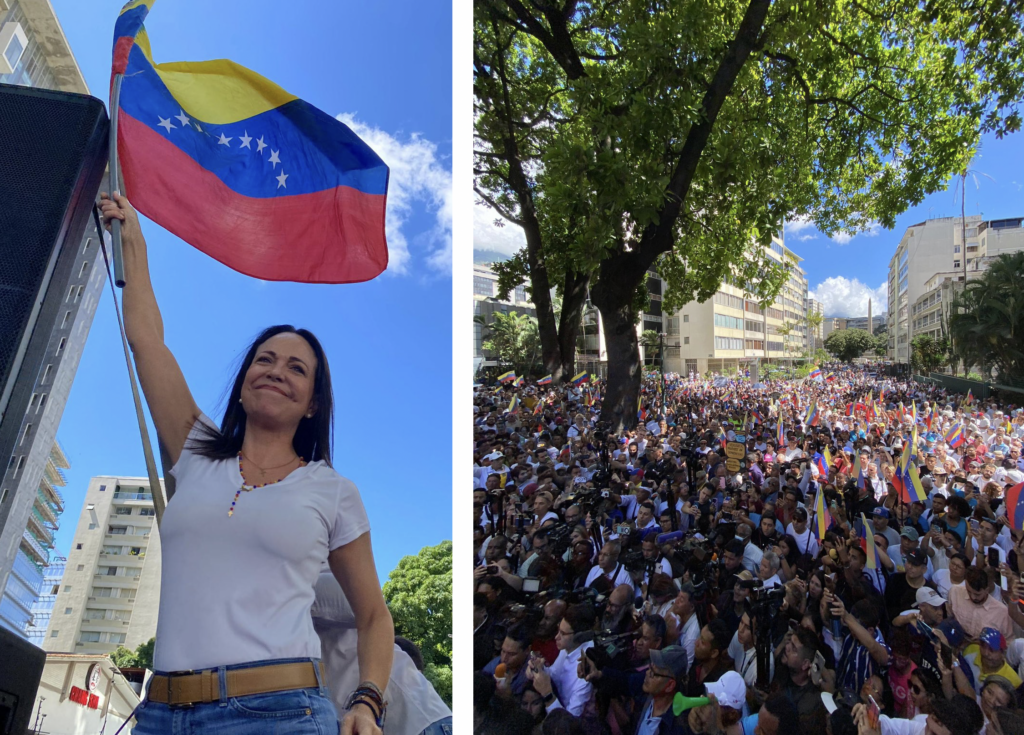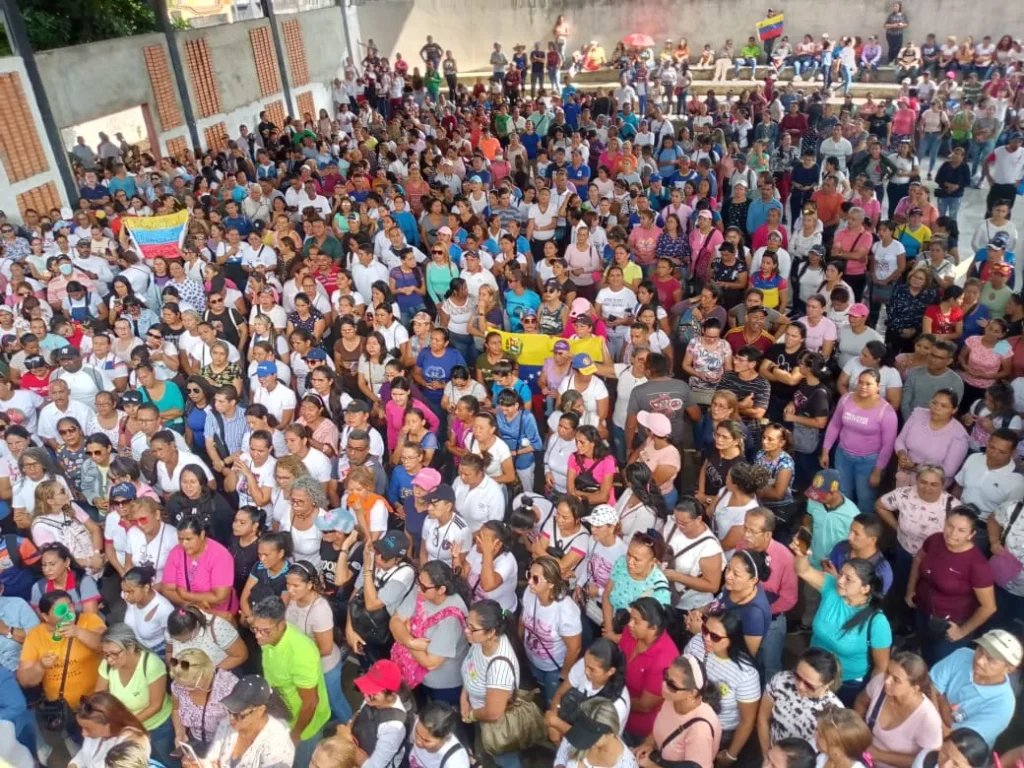The Barbados Agreement Is Full of Traps. But the Opposition Still Has a Chance.
The Barbados Agreement, through its enshrinement of the Chavista legal apparatus, is full of traps for the opposition. But, by not wasting its recently-found leverage, the opposition can still move forward.


When Venezuela’s Supreme Tribunal of Justice (TSJ) ratified the ban from running for office of opposition candidate María Corina Machado and former candidate Henrique Capriles, on January 26th, Chavismo and the mainstream opposition had wildly different outlooks on the future of the Barbados Agreement – signed by both groups in October to guarantee electoral conditions and political rights before the 2024 Venezuelan presidential elections.
“The regime decided to end the Barbados agreements,” Machado said, “what is not over is our fight to conquer democracy through free and fair elections.” Meanwhile, Jorge Rodríguez –the head of the Chavista negotiation delegation– said that “despite the serious threats from far-right sectors against the peace of the Republic, the mechanism established within the framework of the Barbados Agreements has been complied with.”
Both views, both reactions to the same judicial decision, steem from the Achilles heel of the Barbados Agreement: it lacks an accompanying process of judicial reform or re-institutionalization. There’s no revamping of the courts, no approach at reevaluating the infinite sets of laws that have codified and legally supported autocracy in Venezuela.
Instead, the agreement’s text legitimizes the arbitrary decisions of a neo-patrimonial elite in control of a predatory state as ‘rule of law’, supported by independent institutions and with due process. When the Agreement’s text says it is based on “other applicable legal norms” and promotes the authorization of candidates only if they comply with “established requirements” by “procedures” of Venezuelan law, the alleged guarantees are at the mercy of the legal architecture of Chavismo; of its authoritarian judicial activism, of decisions that are truly political.
Thus, contradictorily, the Barbados Agreement acknowledges the lack of electoral guarantees in Venezuela but treats the current Venezuelan discretionary legal framework as that of a liberal democracy. Its institutions hijacked by warring factions of Chavismo, its repeated use of courts to trample on unfavorable electoral results, become “procedures” and “legal norms.”
Therefore, the Agreement’s points are hijacked by the arbitrariness of Chavista lawfare enshrined in the text: as we witnessed this week, with the ratification of the bans on Machado and Capriles. Thus, for Chavismo –as Jorge Rodríguez clearly– Barbados has been fulfilled. The opposition, inadvertently, falls in a trap.
And Chavista authoritarian judicial activism isn’t a new tool. For Raúl Sánchez Urribarri, associate dean at La Trobe University in Australia, the Venezuelan Judiciary –and especially the TSJ– “is a key institution in the functioning of the Venezuelan autocracy” which perpetuates authoritarian judicial activism through its “lack of independence” and its “political and ideological commitment to defending the interests of the regime.”
Examples of this abound. When the opposition won the 2015 parliamentary elections with an absolute majority, for example, the TSJ declared the National Assembly in contempt for swearing three lawmakers from Amazons and later stripped all of the Assembly’s powers. In 2016, a constitutionally-based recall referendum process by the opposition was canceled by Chavista-controlled regional courts after baseless fraud accusations. In 2021, the TSJ also invalidated the results of regional elections in Barinas after the opposition won and then ordered a repetition (Chavismo lost again).

But while Machado and Gerardo Blyde –the opposition’s chief negotiator– are right to acknowledge the Barbados Agreement’s role in allowing the primaries to happen (and, precisely, avoid a judicial move from Chavismo), the opposition now finds itself heading towards a cul-de-sac. For Blyde, there was a “violation” of the Agreement and the revision of Machado’s and Capriles’ bans had no due process. “We demand that the counterparty comply with the agreement in its entirety, it is not in bits and pieces. It is an integrally designed agreement. And the cessation of repressive escalation”, Blyde said, “We also demand that the decision taken yesterday be reversed for having violated the agreed procedure.”
Blyde also said the opposition’s Unitary Platform will hand a written complaint to Norway, the mediating country, and other accompanying countries. He also asked Lula, Emmanuel Macron and Gustavo Petro to do “everything they can” to save the Agreement. The U.S. has also said it will “review” its sanctions policies. As in the past, the opposition is betting on its international allies as leverage to pressure Chavismo.
But, while Chavismo has backed down with other violations of the Agreement (such as Roberto Abdul’s detention or the arrest warrants on other members of Machado’s team), such a public and notorious decision as the TSJ’s rulings seem unlikely to be reversed. It would not only publicly jeopardize the TSJ’s legal authority but taunt Jorge Rodríguez’s quite public statements on the impossibility of Machado becoming the opposition’s candidate.
From now on, the opposition must continue pressuring on a lift on bans and on the survival of the Agreement –of which the vast majority of points, from audits to new electoral registry points and international electoral missions, haven’t been compiled yet. But it should also not waste the opportunity that the elections could provide, despite the considerable asymmetry of power between the regime and the Unitary Platform.
Both the Unitary Platform and Machado have rightly repeated their strong willingness to continue in the “electoral route.” Such move could signify a substitute candidate endorsed by Machado, capitalizing on her aura and the hopes her rise have ushered, just as a banned Juan Perón did with Héctor José Campora in 1973 and a banned Aung San Suu Kyi did with Win Myint during the 2018 Burmese transition. Or, without having to go to other latitudes, the way the opposition managed to win the Barinas state government in January 2022 with a lesser-known candidate and despite the discretional bans on the first three options. Perhaps Freddy Superlano is right: si Barinas pudo, Venezuela puede.
But the Barinas elections have another lesson that the opposition must not pass. In the first round, Freddy Superlano won with 37.60% of the vote over the Chavista candidate’s 37.21%. In the repetition, Sergio Garrido won with 55.34% over the Chavista candidate’s 41.30%. The outrage over the repetition attracted the support of non-Chavista forces outside the Unitary Platform and gave the opposition 18 new points.

The primaries have had a similar effect. Manuel Rosales, a critic of the primaries and governor of Zulia from Un Nuevo Tiempo, is now openly defending and supporting Machado. Fuerza Vecinal, a “loyal opposition” party, imploded after trying to sabotage the primaries: losing, in the stroke of a pen, eight mayors –including one in east Caracas– and around 60 regional leaders including regional lawmakers and councilors. And, for the first time since 2019, Venezuelans who identify as ‘opposition’ are now the biggest self-identification block according to polls by Delphos.
Nevertheless, the opposition must not limit itself to a merely electoralist strategy. It must articulate the social movements in the country and seize the discontent: the labor unions in the dilapidated public industries of the south and the oil fields, the continuous waves of labor protests led by public teachers, the minor regional parties outside the Unitary Platform, the indigenous self-defense groups fighting state-promoted mining and even communal councils and dissident Chavistas. Similarly, the opposition must join hands with social organizations in the country’s rural regions – which not only had a higher participation rate than the national average in the 2021 regional elections but also overwhelmingly voted for non-Chavista candidates in former Chavista strongholds.
Therefore, the opposition must not waste this revitalization and its rapid re-consolidation in one pole, which is sweeping away the chances of non-unitary candidates from the “loyal opposition” like Benjamín Rausseo, José Brito and Antonio Ecarri. Instead, the Unitary Platform’s substitute candidate –in the likely case the bans are not lifted and Barbados continues imploding– must harvest the effects unleashed by the primaries and María Corina’s rise while capitalizing on discontent within Chavismo. But Machado’s blessing and approval will be pivotal. If not, fragmentation will follow and the small –and incredibly fragile– window of opportunity that 2024 represents will be gone.
Caracas Chronicles is 100% reader-supported.
We’ve been able to hang on for 22 years in one of the craziest media landscapes in the world. We’ve seen different media outlets in Venezuela (and abroad) closing shop, something we’re looking to avoid at all costs. Your collaboration goes a long way in helping us weather the storm.
Donate




